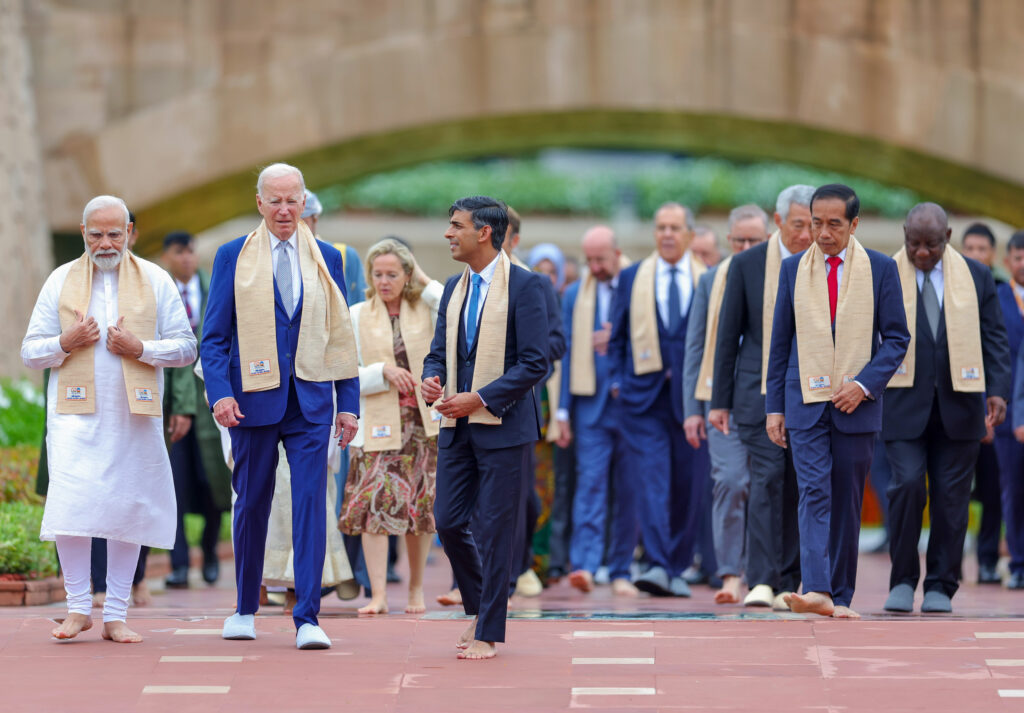In a reflection of the nation’s growing assuredness, India’s foreign policy is transitioning from hedging its bets and playing to all sides to a more purposeful goal of creating a free and open Indo-Pacific with like-minded nations. The deepening US–India partnership affords India greater agency — emboldening its strategic autonomy, independence and scope of operations.
Prime Minister Narendra Modi is expected to win his third consecutive national election, which will begin on 19 April 2024. The continuity of Modi’s administration, with a respected external affairs minister and national security apparatus, has been a strong catalyst for a more assured and ambitious Indian foreign policy.
India under Modi is pursuing three broad and reinforcing objectives. First, to sustain a high economic growth rate to become the third largest economy by the end of the decade. Second, to develop unassailable deterrence capabilities along the length of its land borders and become the dominant naval power across the Indian Ocean. Third, to use its own brand of hard and soft power to become a leader of the Global South.
In seeking to achieve these goals, India is emerging from a young republic’s natural caution towards alliances not of its own making. The United States’ founding father, George Washington, preached circumspection against European entanglements. As the United States grew, so did its interests and commitments. India is experiencing a similar reality in pursuit of an interest driven global strategy that advances its proximate and general interests through advantageous partnerships.
In his second address to the US Congress, Modi refrained from heeding to the hesitations of history, instead emphasising the India–US bond with a promise for global good. Since India’s independence in 1947, its relationship with the United States has had its ups and downs, but over the last two decades the two nations have enjoyed a steady convergence of national interests.
Modi was keenly aware that the only other two nations whose sitting prime ministers were accorded the privilege to address the US Congress twice — the United Kingdom and Israel — were able to mobilise their relationships with the United States to enhance their global standing and military and economic capabilities.
The Modi administration has pursued an increasingly realpolitik approach to its strategic partnerships. India’s strategic autonomy and scope of operations has also greatly expanded. On the sidelines of the 2023 G20, the United States and India advanced their deepening partnership after resolving a longstanding trade dispute. They pledged to co-manufacture jet engines, chip foundries and new-age telecommunication systems in India. The breadth of the India–US partnerships may see it become India’s most consequential bilateral relationship of the early 21st century.
India has also emerged as a solid champion of the Quadrilateral Security Dialogue. This has been a strong catalyst for deepening India’s bilateral ties with Japan and Australia. It has also greatly buttressed India’s standing among the ASEAN community.
Modi has forged unprecedentedly strong relations with West Asian nations, including the United Arab Emirates, Saudi Arabia and Israel. This constitutes a stepping stone towards its growing commercial and political ties to Mediterranean and European countries. On 10 March, India inked trade pacts with Norway, Switzerland, Iceland and Liechtenstein and it is negotiating trade agreements with the United Kingdom and the European Union.
India’s growing outreach led to the launch of the India–Middle East–Europe Economic Corridor at the 2023 G20 Summit in India. This Economic Corridor could be a strong alternative to China’s Belt and Road Initiative as a multilateral initiative with strong economic and political fundamentals but without any one nation dominating the effort.
Strategic partnerships with G7 nations offer India a wider canvas in world affairs in persuading the Global South that their interests are better served by seeking greater representation within existing institutions than by joining alternative ones beholden to autocratic China.
India is strengthening these relationships while maintaining a facade of fraternity with Russia. India cannot afford for all its major neighbours abutting its northern borders to be adversary. While a close relationship with Russia, even if symbolic, offers a useful counterpose to China and Pakistan, India is rapidly reducing its dependence on Russia for its defence systems and energy.
One of India’s longstanding objectives is to gain a permanent seat on the United Nations Security Council. China’s persistent opposition presents an intractable barrier. But it is in the United States’ and European countries’ interests to welcome India to the G7 to ensure that the group is more inclusive and representative of the global economy. The Organisation for Economic Co-operation and Development would also benefit from India’s presence. As India’s economy grows, so will its obligations to be a reliable and responsible contributor to a rules-based global economy.
India’s ascendance towards its ‘rightful place’ among the world’s nations goes hand in hand with a realisation that strong reciprocal alliances reinforce, not weaken, a nation’s autonomy and options. As India strives to become a world leader, it will face more demands — to be both a strong, independent nation and a reliable and trusted ally. Valuing strategic autonomy and being a dependable ally are not contradictions but are reinforcing virtues of a strong nation. India’s evolution from straddling fences to standing tall appears to be heading in the right direction.
Kaush Arha is President of the Free & Open Indo-Pacific Forum, Senior Fellow at the Atlantic Council and Senior Fellow at the Krach Institute for Tech Diplomacy at Purdue University.
This article appears in the most recent edition of East Asia Forum Quarterly, ‘India’s Sweet Spot‘, Vol 16, No 1.


Leave a Reply